Best Philips Hue lights 2025: sophisticated smart bulbs for your space
The best Philips Hue lights bring state-of-the-art, remote-controlled lighting to your home

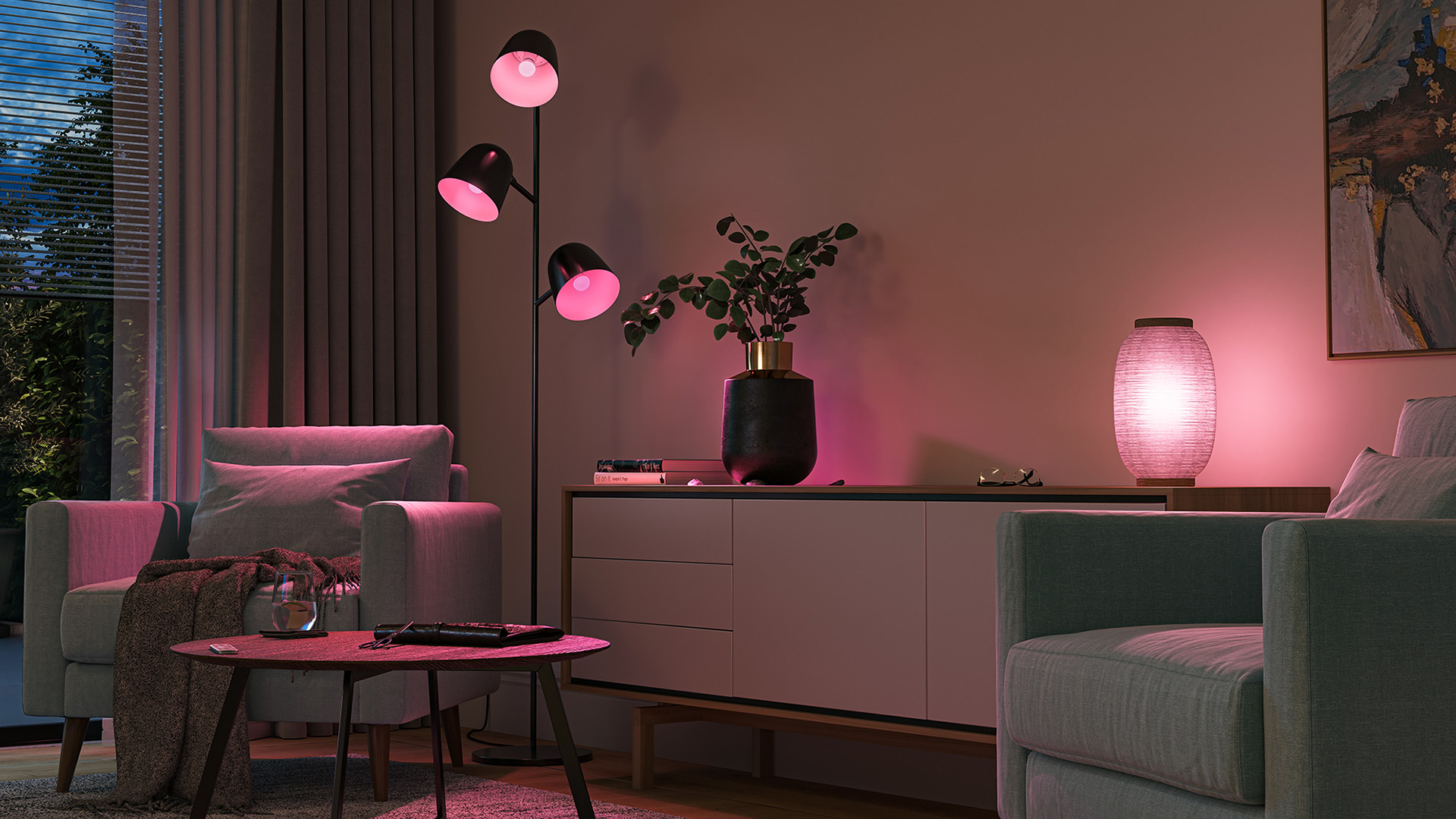
Get all the latest news, reviews, deals and buying guides on gorgeous tech, home and active products from the T3 experts
You are now subscribed
Your newsletter sign-up was successful
We're huge smart lighting enthusiasts here at T3, and have been testing outdoor smart lights now for over half a decade. In our opinion, if you're shopping in this sector, then you should shop for some of the best Philips Hue lights.
This is because Philips Hue has the biggest and best range of smart lights, and thanks to its best-in-class app, the firm also offers the best experience to consumers when it comes round to customisation and personalisation.
For us personally, that latter point really is why people buy smart lights – to customise the look and mood of their home's interior and exterior. From wall-mounted lights to light strips, string lights and more, Philips Hue has a wide range of smart lighting that can completely transform your space.
When it comes to picking the best outdoor lights or best smart bulbs, these Philips Hue models will give standard lighting a run for its money. They're perfect for different colour features, exciting effects and adjusting the brightness and the dimness, all of which depend on the atmosphere you’re looking to create. Philips Hue lights are also extremely easy to set up and use via an app on your phone.
Check out our full guide to the best Philips Hue smart lighting below, for all your inside and outside needs.
The best Philips Hue lights 2026
Interior lights
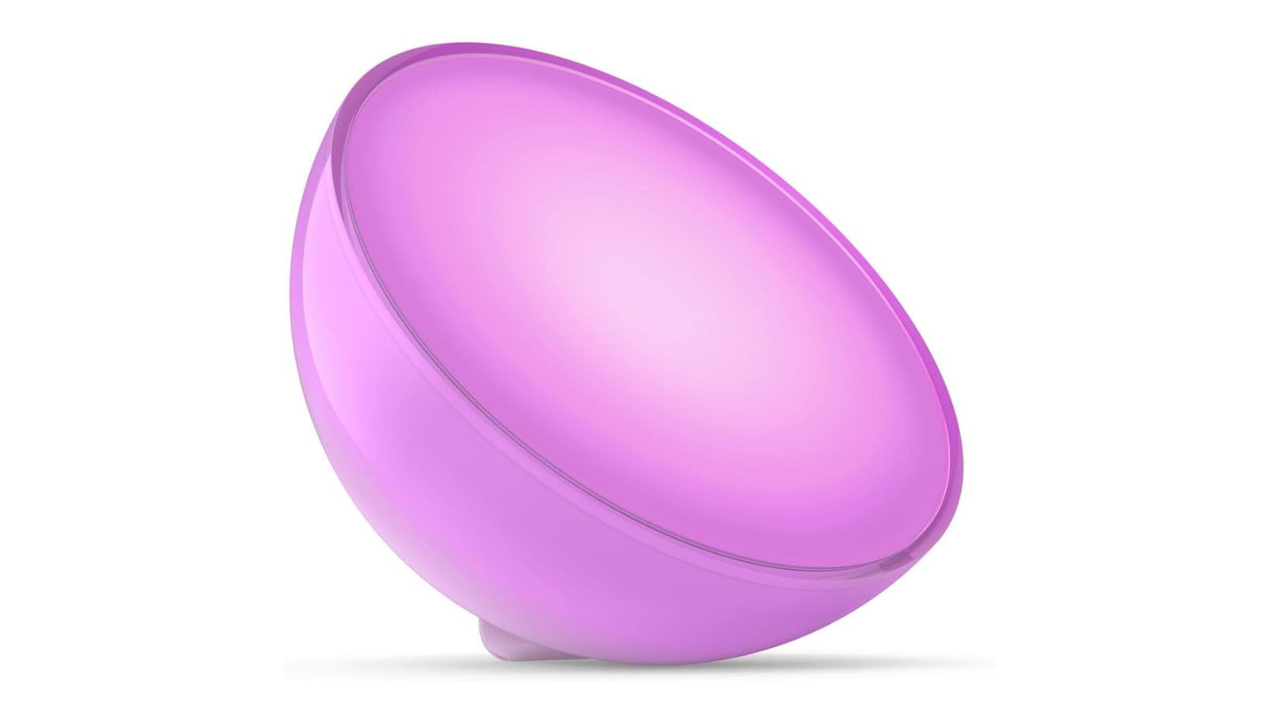

1. Philips Hue Go 2.0
Reasons to buy
Reasons to avoid
This is the second generation of Philips Hue's Go portable lamp, with the newer model boasting a more compact design. With its built-in rechargeable battery, you can the lamp wherever you go. It can either be used as a stand-alone light, or part of a Philips Hue lighting setup when connected to the Hue Bridge.
It also features seven different lighting options, all activated by small button on the side or via the Philips Hue app. Users can choose from cool energising daylight, warm relaxing light, and five different dynamic light effects. It's not as bright as some of Philips Hue's other smart lights, but it's the perfect option for those who prefer cosy, ambient lighting in the evenings.
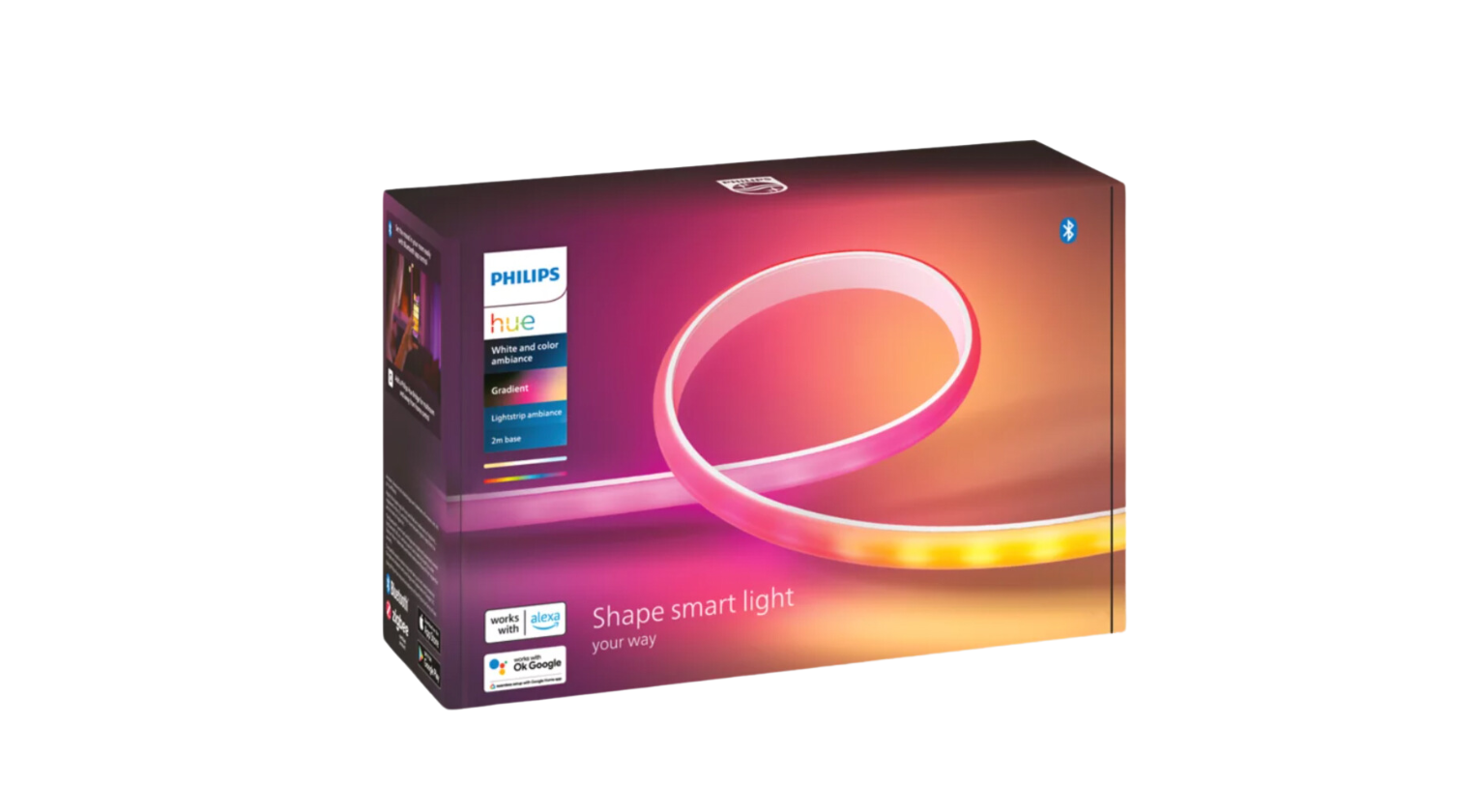

2. Philips Hue Gradient Lightstrip
Reasons to buy
Reasons to avoid
This Philips Hue light strip provides users with a seamless blend of multiple colours at the same time, all controlled via the Philips Hue app. The colours flow together naturally, casting light to showcase a unique effect. The two metre base kit can be cut to whatever length, as well as extended up to 10 metres. It's also extremely easy to set up, with the adhesive lasting for a long time.
The Gradient Lightstrip is specifically designed for a diffused look, showcasing an opaque sleeve which ensures a seamless, smooth gradient effect and reduced reflection. However, it does need to be near a plug, which somewhat limits its positioning.
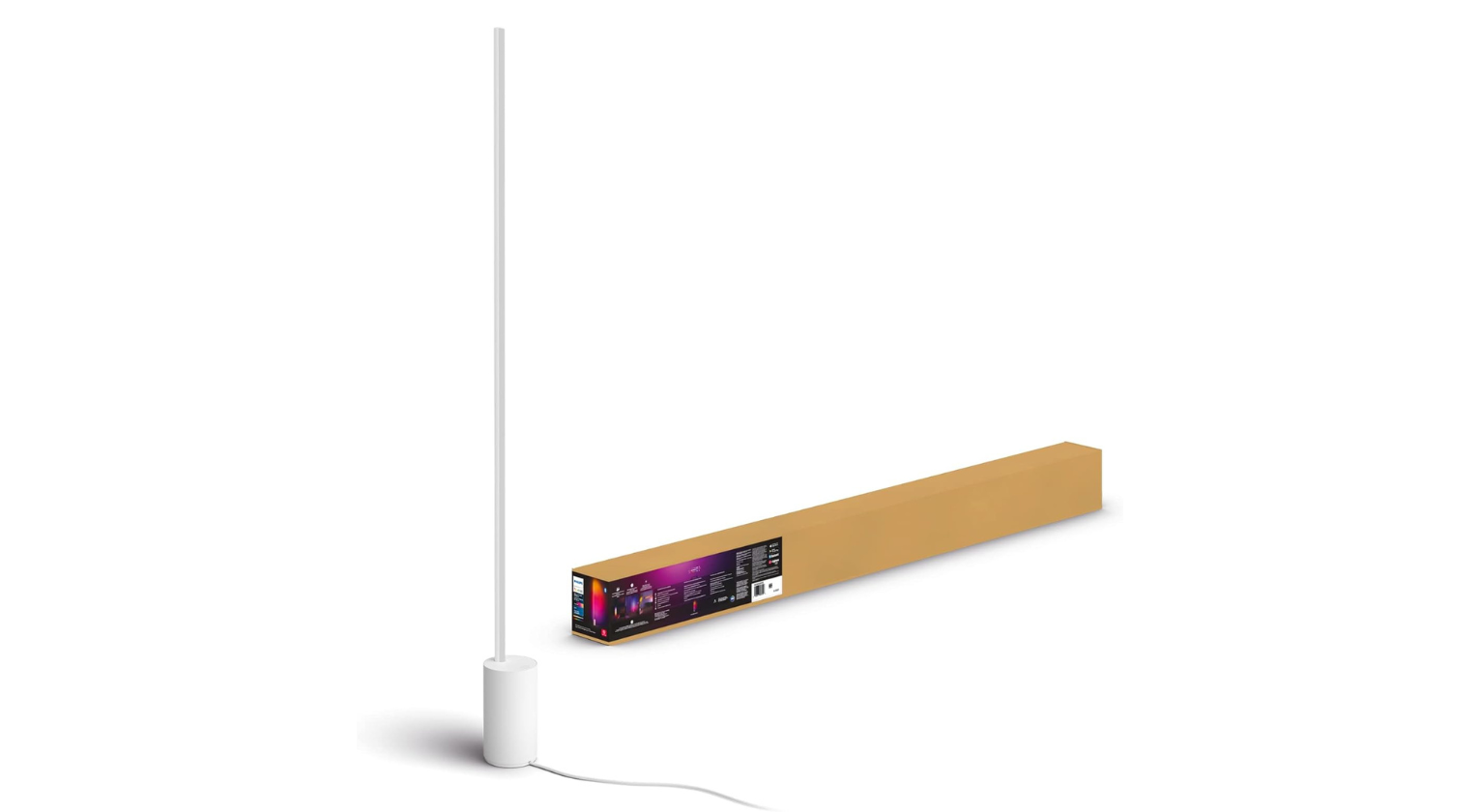

Reasons to buy
Reasons to avoid
This is one of Philips Hue's most recognisable smart lights, especially as not many smart lighting brands have created a competitor. It's the perfect light to complement any decor, especially when it comes to its slim, stylish design. Like the Gradient Lightstrip, the Signe blends multiple colours together to paint the walls with a unique gradient of light.
It's available in black, white and oak, and can be controlled via the Philips Hue app or connected to an existing smart lighting setup using the Philips Hue Bridge. There's also a table lamp version if you're after something a little smaller.
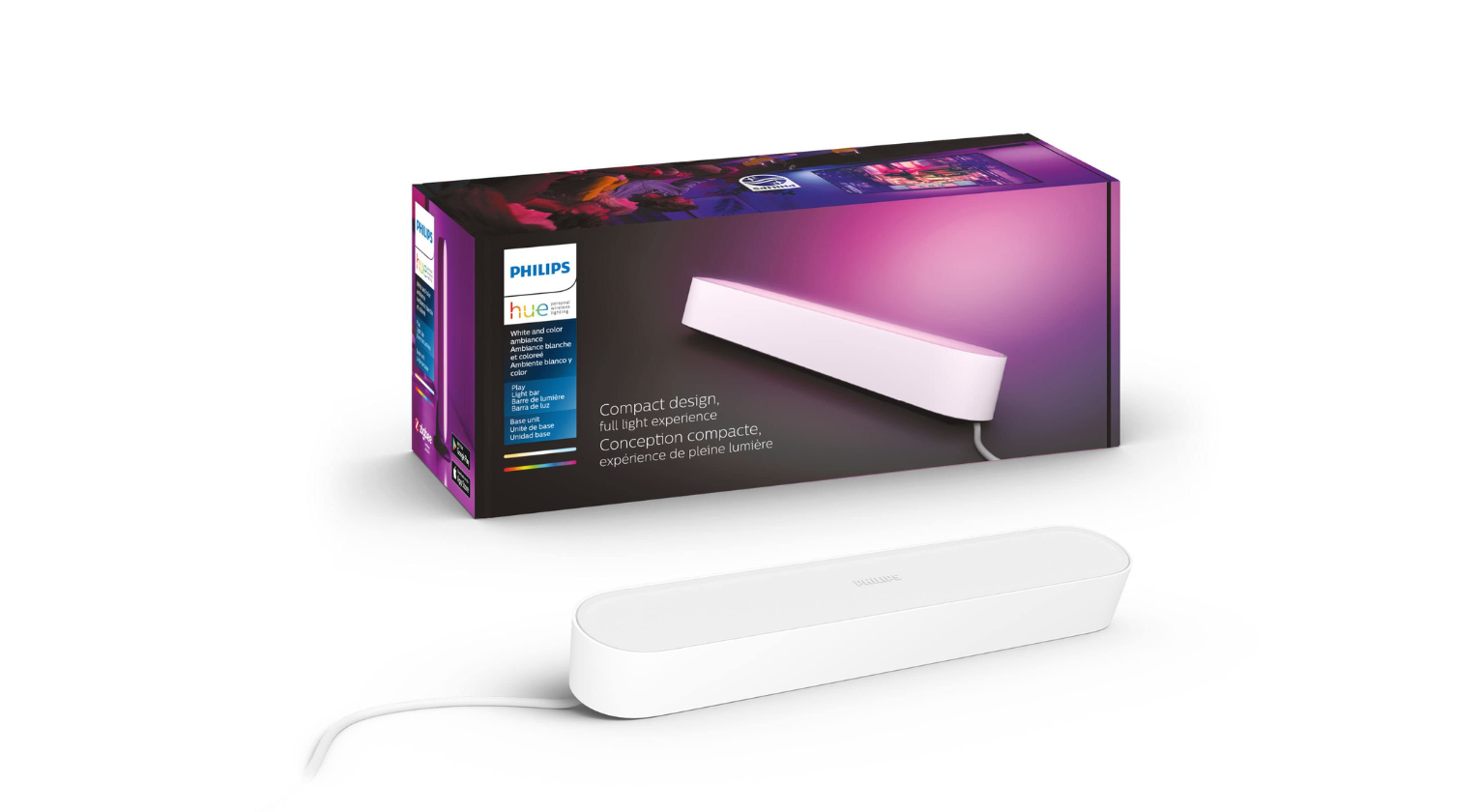

4. Philips Hue Play light bar
Reasons to buy
Reasons to avoid
Create a powerful wash of colour with the sleek design of the Play light bar. It includes a power supply that can connect up to three light bars in total, and can be stood upright, laid horizontally or placed onto the back of your TV with the included mounts.
Users can choose from black or white, and there's the option to select the base kit, additional two bar pack and an extension pack. This allows you to build your entertainment setup to whatever your preferences are.
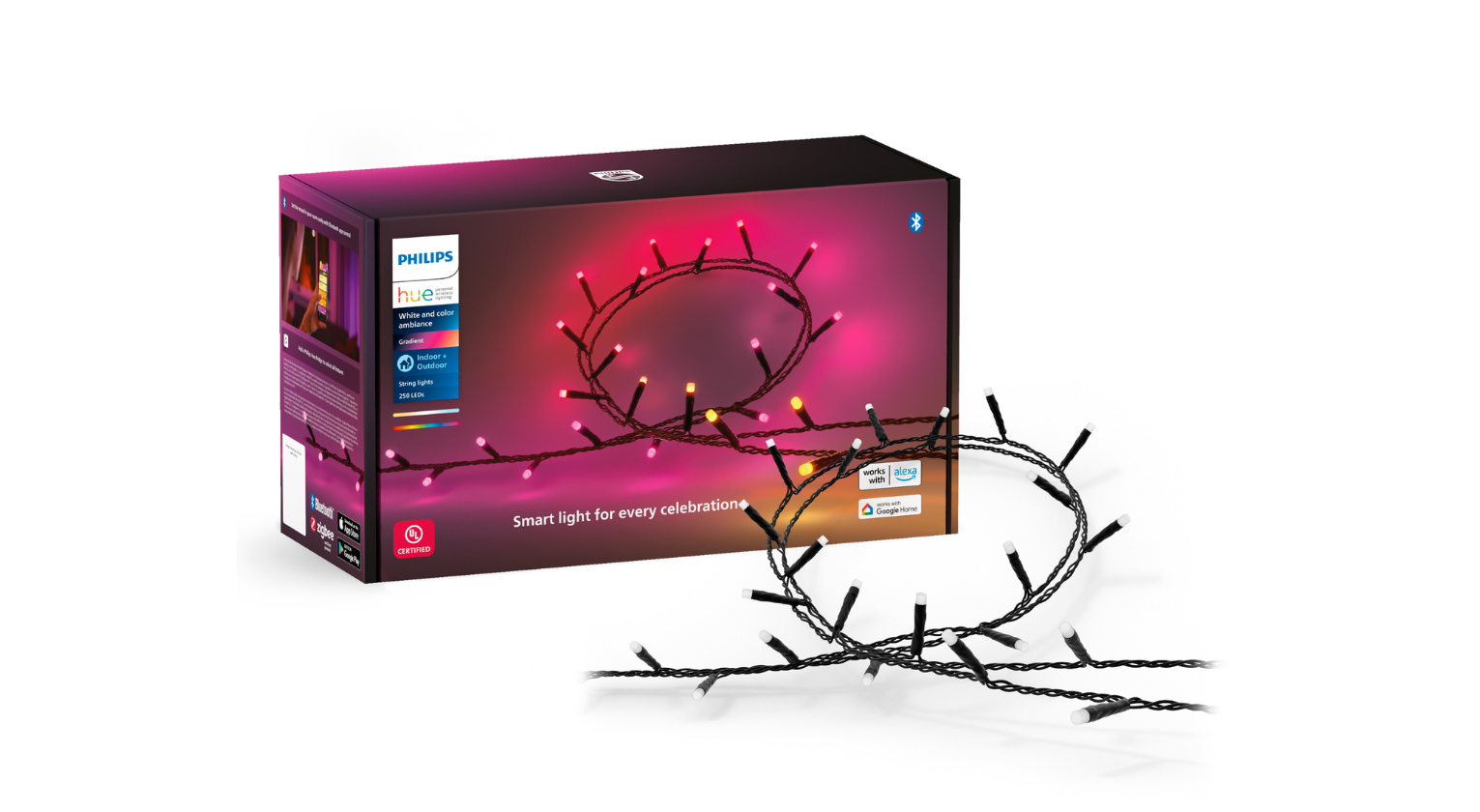

Reasons to buy
Reasons to avoid
The Philips Hue Festavia String Lights were released in 2022, but the brand announced in 2023 that it was launching a new generation of the popular lights. The new model is able to work outdoors as well as indoors, and became available in two more varieties: 100 mini LEDs and 500 mini LEDs.
The latest indoor/outdoor Festavia lights have two lighting styles which look to mimic traditional fairy lights. The Sparkle setting makes the LEDs twinkle, perfect for the festive season. The Scattered setting focuses on the colour of the lights, and allows users to randomise up to five colours in different sequences. It is important to note that if you purchased Festavia string lights before 2023, the string lights are for indoor use only.
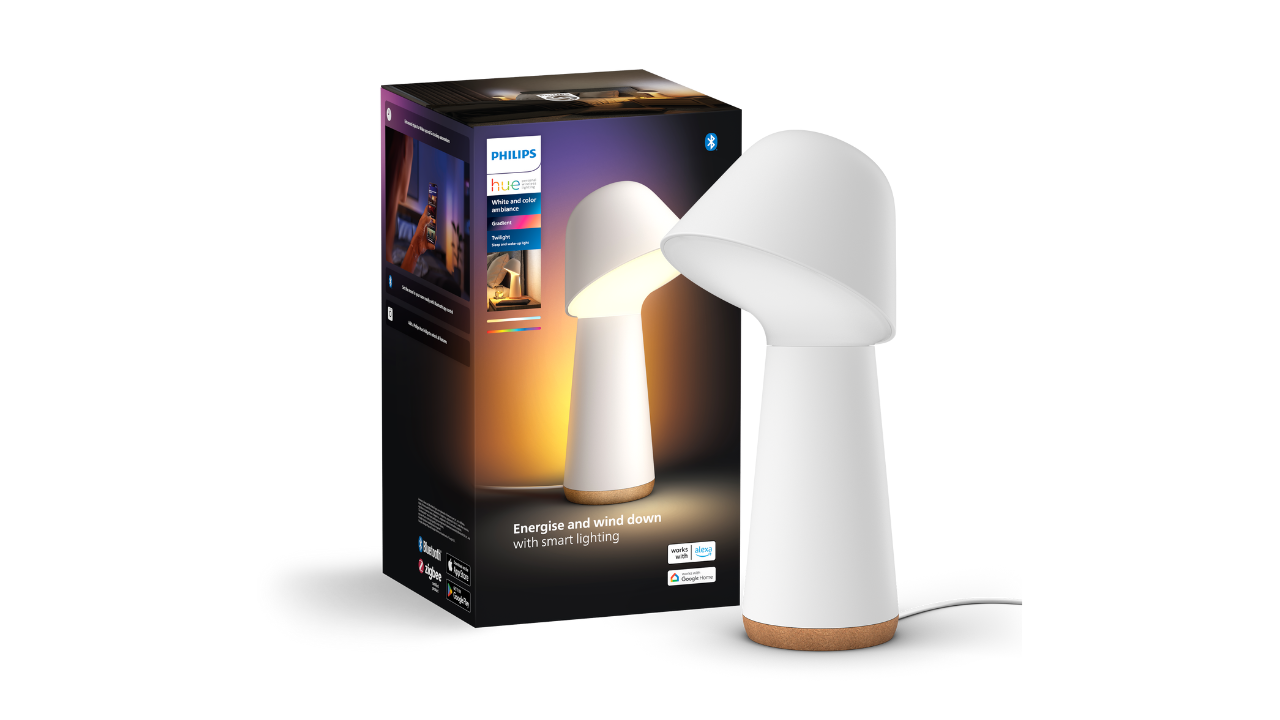

6. Philips Hue Twilight
Reasons to buy
Reasons to avoid
The Philips Hue Twilight is one of the brand's most recent lights, and is designed to help its user maintain a regular sleep routine, fall asleep peacefully and wake up feeling fully rested. It has two individual light sources, an illumination head and a back light, designed to mimic the wide palette of colours in both morning and evening sky light.
With just a quick tap, you'll be able to prompt your bedroom lights to slowly dim until off. Users can also schedule a wake-up automation, which gradually brightens before reaching the colours of the morning sun. The Twilight's compact design means it can easily fit onto a bedside table, and the choice between white or black allows it to blend into most bedroom aesthetics.
It is a little pricey and might not be everyone's cup of tea, but it's still great to see Philips Hue branch into wellness products a little more.
Exterior lights
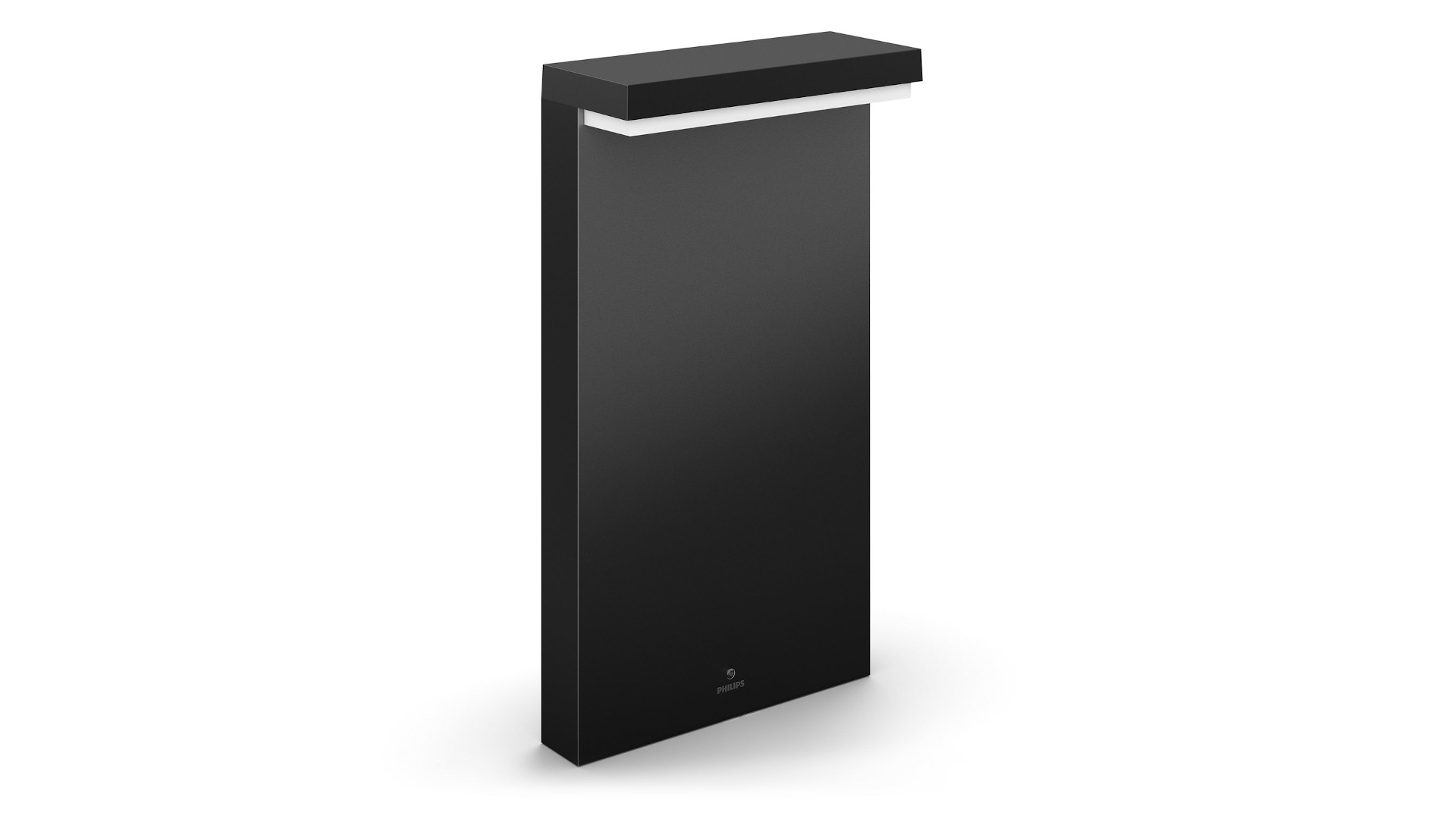

6. Philips Hue Outdoor Nyro Pedestal Light
Reasons to buy
Reasons to avoid
You're not short of pedestal light options in the Hue range, and the razor-sharp appearance of the Nyro is no exception. Bursting up from beside your path or patio with its sharp coated aluminium features, this is an absolutely stunning light before you've even switched it on.
It has enough weather resistance to deal with splashed water, which means it'll be fine in the rain, but it's probably not a good idea to set a sprinkler on it. At 1,000 lumen, it's one of the brighter options in the Philips Hue range, which means you'll get some significant path coverage.
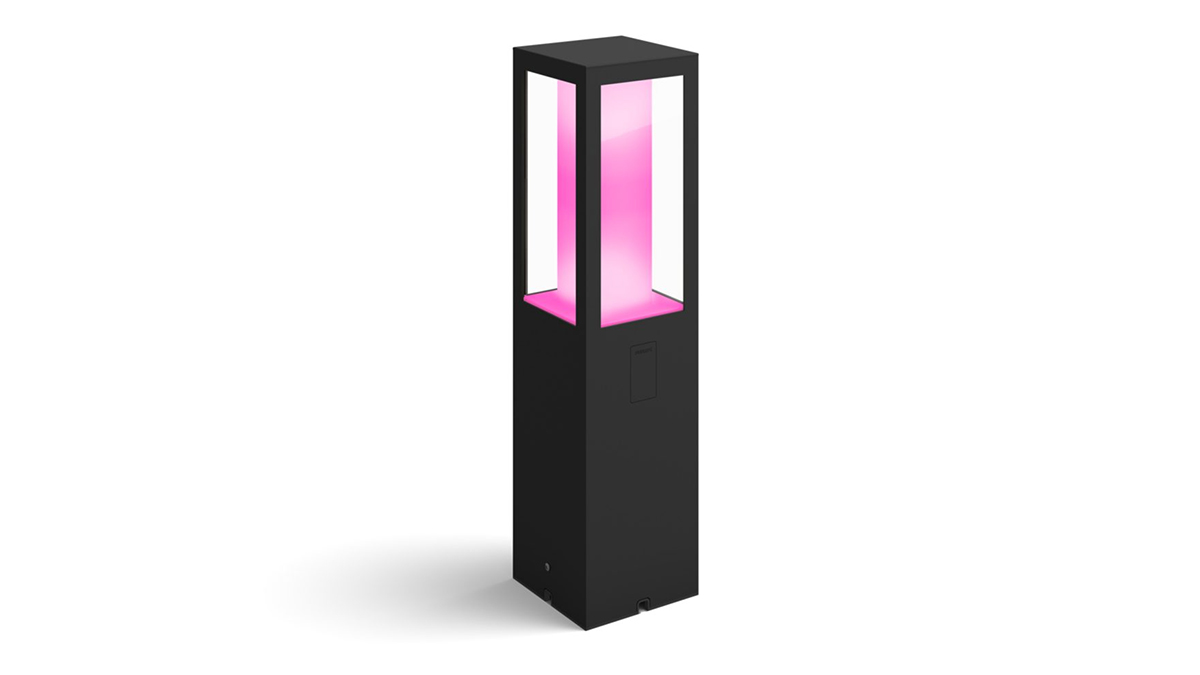
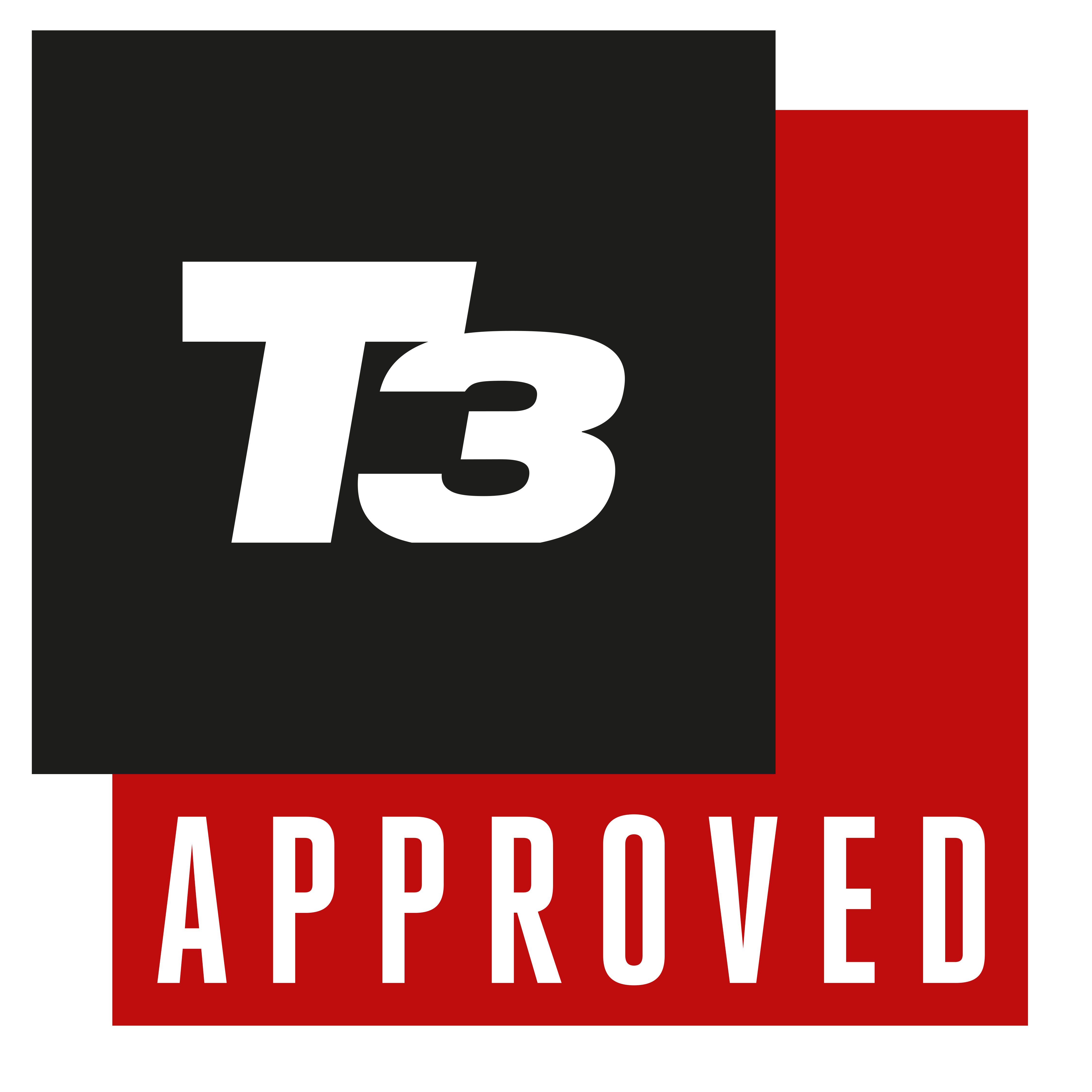
7. Philips Hue Impress Outdoor Pedestal
Reasons to buy
Reasons to avoid
Stick the Impress Outdoor pedestal in any outdoor spot and it's guaranteed to add a touch of style and class as well as some pretty bright illumination. The lamp is capable of reaching 1200 lumen (though you don't have to go that bright if you don't want to), and you can go with a solid white or all the colours of the rainbow.
As you would expect from an outdoor lighting fixture like this one, it comes with IP44 waterproofing, so it's well protected against the elements. Note too that it's a fairly chunky piece of kit, measuring 40 cm x 10 cm x 10 cm (that's 15.7 inches x 3.9 inches x 3.9 inches), so factor that into your planning too.
Considering the very reasonable price that you'll pay for the Impress pedestal, and the decent number of tricks you can do with it, this is definitely one of the best Philips Hue outdoor lights at the moment. The Impress is also available as a wall light, and we've got a Philips Hue Impress vs Hue Turaco guide to explain how it compares to Hue's cheaper wall light option.
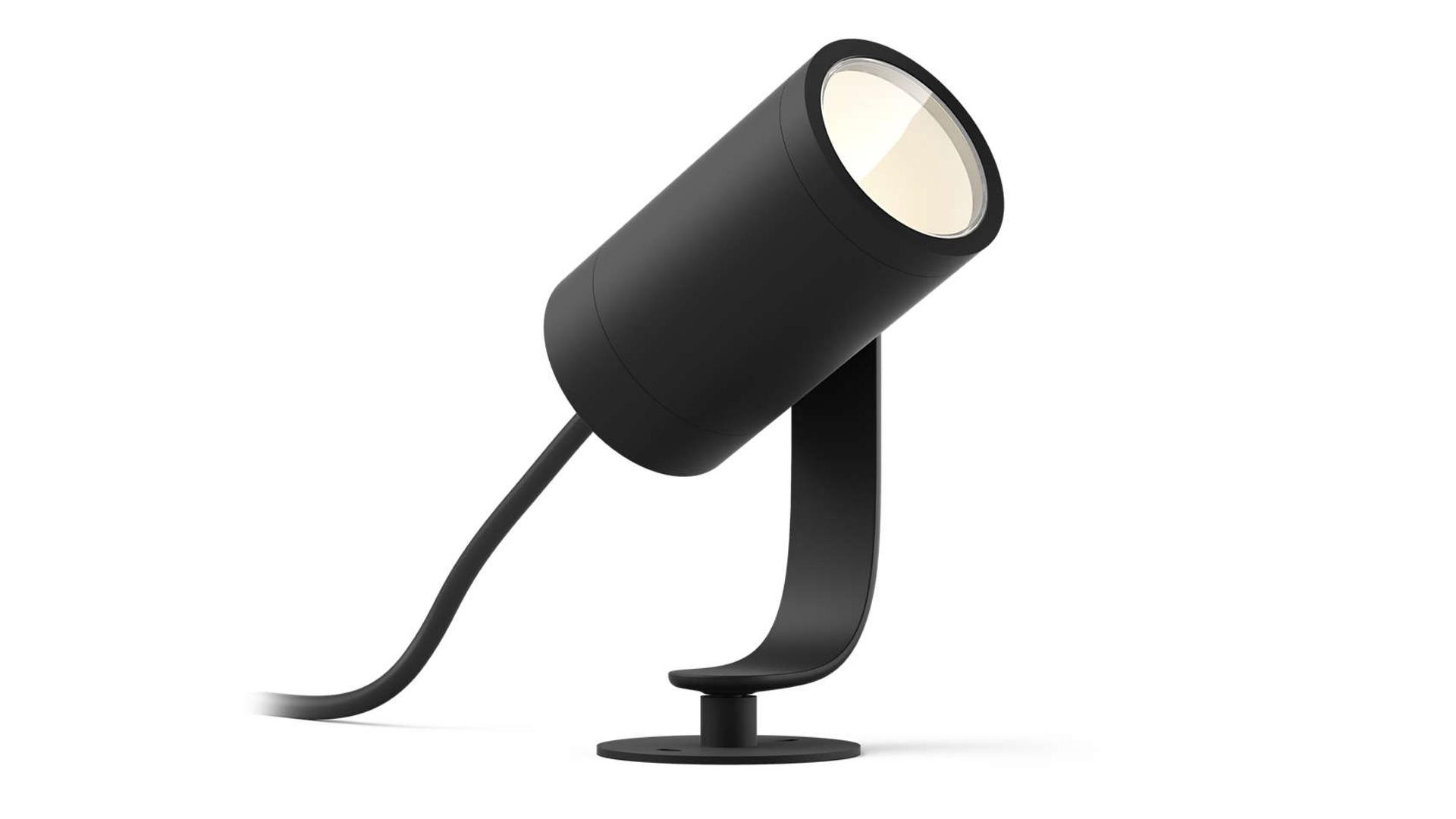
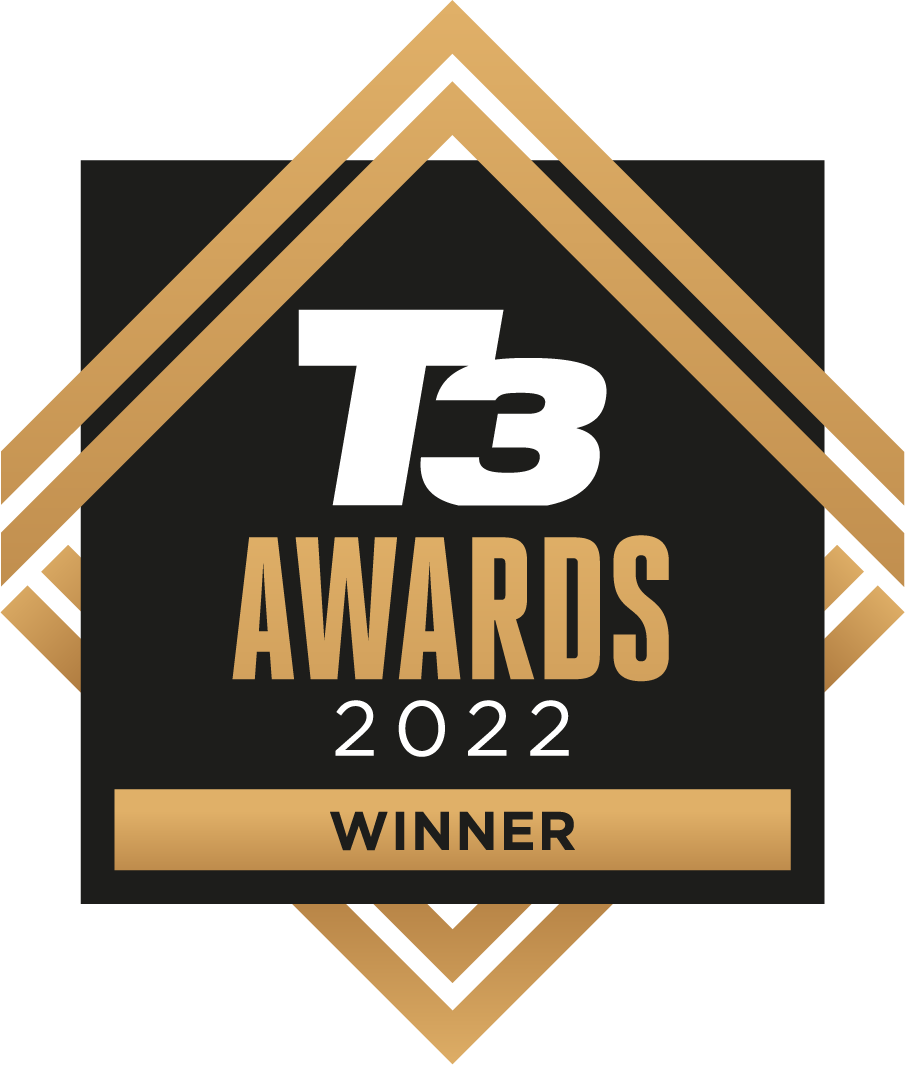
8. Philips Hue Outdoor Lily Spot Light Set
Reasons to buy
Reasons to avoid
The Philips Hue Lily Colour Ambience Spot Light set is a low-voltage spot system, comprised of three matte black aluminium spot lights and replete with mounting stands for walls and spikes for ground installation. These spots are fantastic for lighting up shrubs, flowers and trees.
Setup is straightforward, especially if you already have an outdoor power outlet. Simply join the three spots together using the supplied three lengths of 5m cable and two waterproof connectors, and stick them in the ground or mount them to decking, a wall or fence post. Total coverage is about 25 metres in length, which is ample for most medium-sized gardens. However, you can always add another two for extra range (single Lily spots retail at £80 each).
The Lily spots produce a light output of up to 600 lumens, although some colours will be less bright so perhaps steer away from fully saturated colours and select a slightly lighter hue. Check out our Philips Hue Lily vs Philips Hue Appear guide if you want to see how they compare to another Hue wall-painting option.
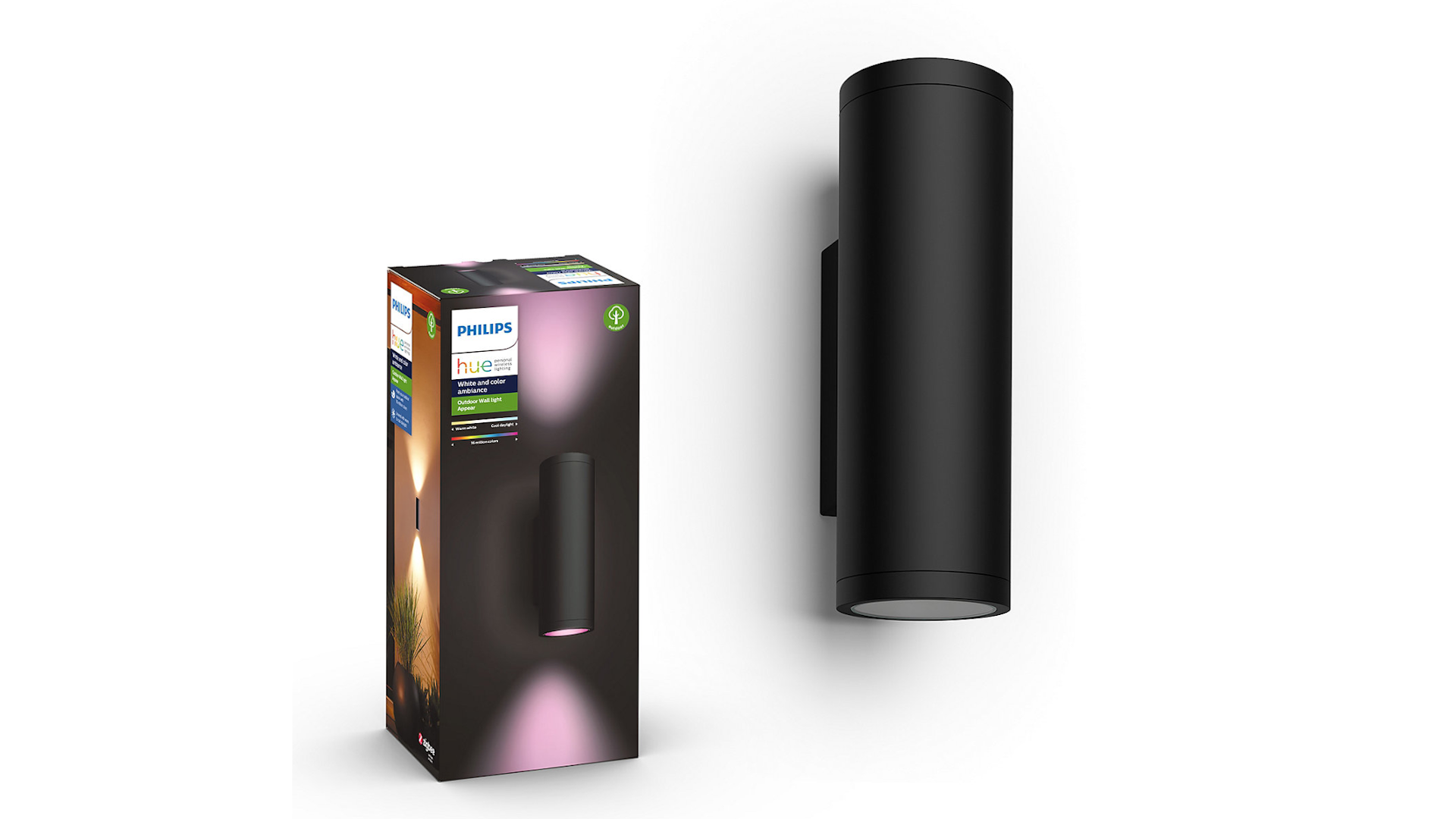

9. Philips Hue Outdoor Appear Wall Light
Reasons to buy
Reasons to avoid
The Appear's triangular projection, emanating from both ends of the cylindrical fitting, is amongst the most striking in the Hue range. It's perfect for making a dull wall into a feature, or used in a pair it's a neat way of highlighting a doorway.
It's IP44 rated, so there's no need to install under a canopy or porch, though as with all Hue wall mounters you'd be best served getting a professional to do the dirty work. You can of course tweak the Appear to hit whatever colour or white temperature suits your wall the best, and compatibility with Hue automations means you can keep its lighting confined to darkness hours or switch it on and off to feign occupation when you're out.
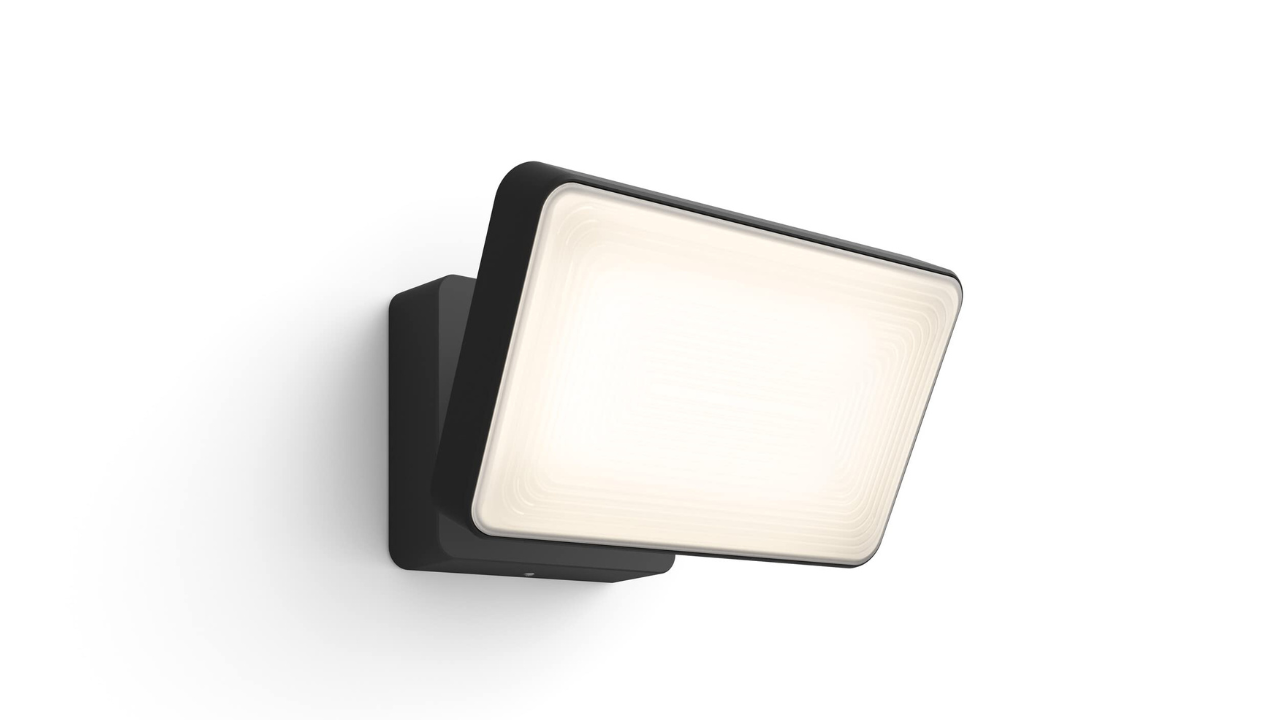

10. Philips Hue Outdoor Welcome Garden Floodlight
Reasons to buy
Reasons to avoid
The powerful 2,300-lumen Welcome is so much more sophisticated than your average bog-standard floodlight. For starters, its colour balance and brightness can be infinitely adjusted to suit the mood. Because it kicks out so much diffuse illumination without dazzling everyone like a halogen bulb, it’s a top choice for evening entertainment. It’s also perfect for security, especially if used in conjunction with Philips’ battery-powered infrared sensor. The Welcome requires both professional installation and a Hue Bridge.
Best Philips Hue Outdoor lights: what you need to know
So, how did we get here? Philips Hue was first launched in 2012 and whilst the range was slow to expand at first, Philips has recently mounted a major expansion. 2018 saw Hue making it outdoors for the first time, and since then, has continued to introduce a whole host of lights to its selection.
The Hue system has traditionally been based around a hub controller which deals with the tricky task of talking to and controlling a houseful of smart bulbs. The Hue Bridge, connected to your router, uses the Zigbee smart home protocol to communicate, meaning it operates on its own slice of the radio spectrum, with a theoretically longer range and less potential interference than competing Wi-fi bulbs. Read our guide on what the Hue Bridge is and what it does for more information on this.
Whilst the £50 Bridge adds a little extra cost (it's included with some indoor bulb packs, but not outdoor kits) its 50-bulb capacity, long reach and high reliability make this the perfect system for smart garden lighting. If you're an existing Hue user any outdoor lights you add should work just fine with your indoor Bridge. Zigbee is technically a mesh network; as long as your Hue Bridge can reach the closest garden light, it should be able to pass messages on to those further down the path.
With recent bulbs, the Bridge is no longer (technically) required; Philips Hue added additional support for Bluetooth as of its mid-2019 releases, though you lose a whole host of functionality connecting that way. Advanced functions go out of the window, and the convenience of being able to connect to your lights remotely through the internet is also in the bin. Go for the full Bridge experience if you can.
So, whether you want to fill your garden with ambient light, get everything flashing away for a party, or hook up a Hue PIR and add a little security, there's something for you.
Interested in a bit more browsing? Check out our guide to the best Philips Hue alternative lights!
Get all the latest news, reviews, deals and buying guides on gorgeous tech, home and active products from the T3 experts

Lizzie is T3's Senior Staff Writer, covering the latest in smart home, lifestyle and beauty tech. From skincare gadgets to vacuum cleaners, she's your go-to for trends and top recommendations.
When not writing, Lizzie enjoys mooching around Bath, spending time with loved ones, or testing her review units – often during an enthusiastic cleaning spree!
- Derek Adams
- Bethan MorganHome Editor